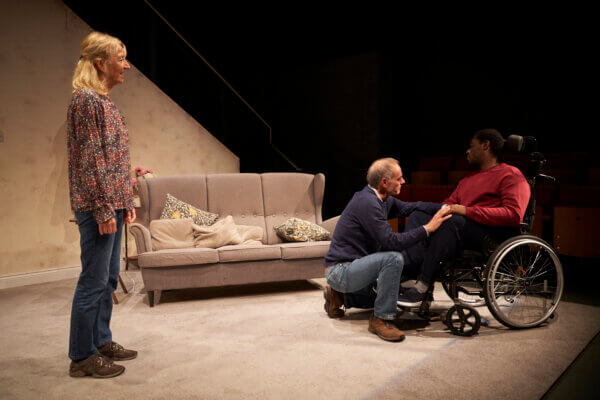Writer: Marilia Samper (translator: Steven Capsuto)
Director: Paula Paz
Julia and Eli live in an apartment block in a poor quarter of a European city. Eli is severely disabled, has no independent movement, and has grown too big for his mother Julia to carry, so the nine steps down to the outside world have become insuperably difficult to negotiate. Eli has to spend all day every day in their tiny apartment, sort of looked after by their next door neighbour Vera while Julia is out at work.
Julia (Jeryl Burgess) seeks help to get a ramp built, to take the wheel-chair outside, and comes up against bureaucratic obstructions. More troublingly, she comes up against hostility from her neighbours when she asks for financial assistance – the world is a cold place, and no-one in her building has much spare cash. And what they have, they want to keep. The play explores Julia’s struggles to help her son, and her increasing distance from any other relationship.
Paula Paz efficiently and sensitively directs this modern morality tale, pitting compassion and human rights against the selfishness engendered by austerity. Julia’s neighbours are self-serving from necessity rather than from malice, although that probably isn’t a distinction that Julia would be inclined to make. Jack Valentine’s intriguingly multi-level set uses a long staircase as a space outside the tiny apartment where Eli and Julia live. It’s where people go to think and smoke and escape from their claustrophobic relationships, and its architectural awkwardness serves the play well.
The strength of the piece, though, is in the acting, particularly Jeryl Burgess’ powerful, nuanced performance as Julia, a mother who sacrifices everything – friends, relationships, health, work – to give all she can to her mute son. It is a fine central role, fiercely loving, obsessive, comprehensible. Reece Pantry represents Eli convincingly, and has a striking role as narrator, voicing the sensory world available to Eli with moving conviction, detailing the loss of stimuli as his mother’s activism shuts out anyone else from Eli’s life. It is a subtle and striking articulation of the world of someone locked in to their body.
A neat production twist makes Reece Pantry double as the most vehement of the apartment’s residents in denying Julia any assistance. It forcibly brings home the complexity of the arguments being acted out – the neighbours are depicted with some sympathy, even as Julia’s isolation and Eli’s restricted world make the core of the play. Howard Teale articulates the anguish of Julia’s friend and landlord, who is reluctant to commit to her cause and cut himself off from any other friendships as a result. His guilt and sadness is powerfully represented.
The dialogue is slightly stilted, possibly as a consequence of having to be translated from Spanish, and there are some stuttery moments in performance, but the keenest perception is of an interesting, nuanced story of the consequences of budget-cutting agendas and economic restrictions, and their impact on humane care, and human rights. It is well told and compelling. It is a tale for our times.
Runs until 19 November 2022

